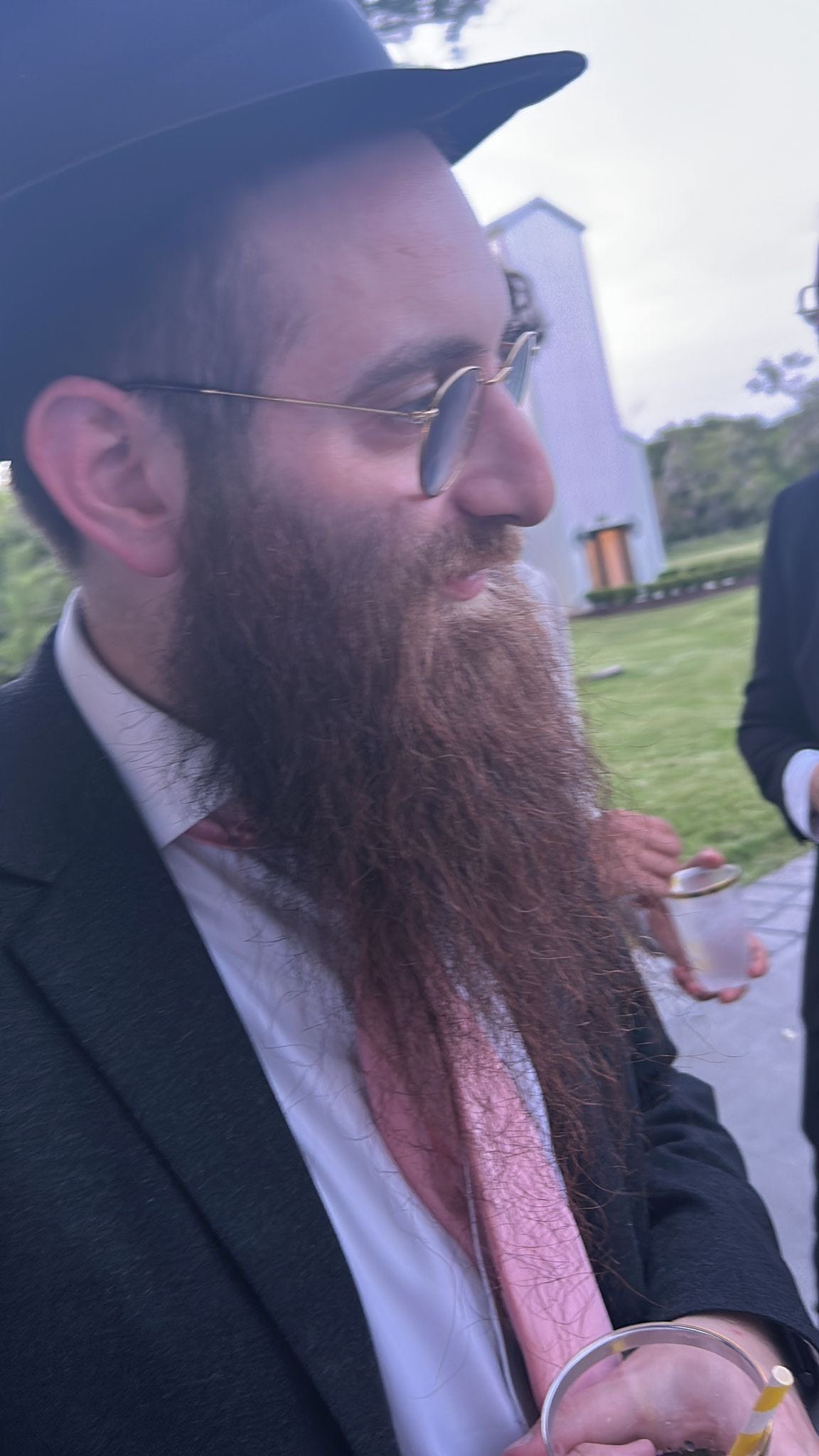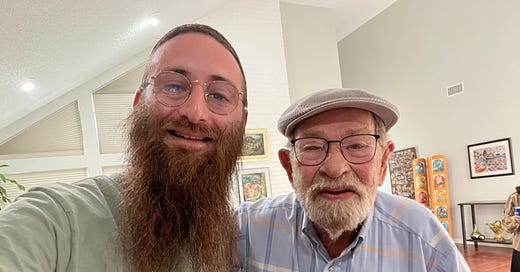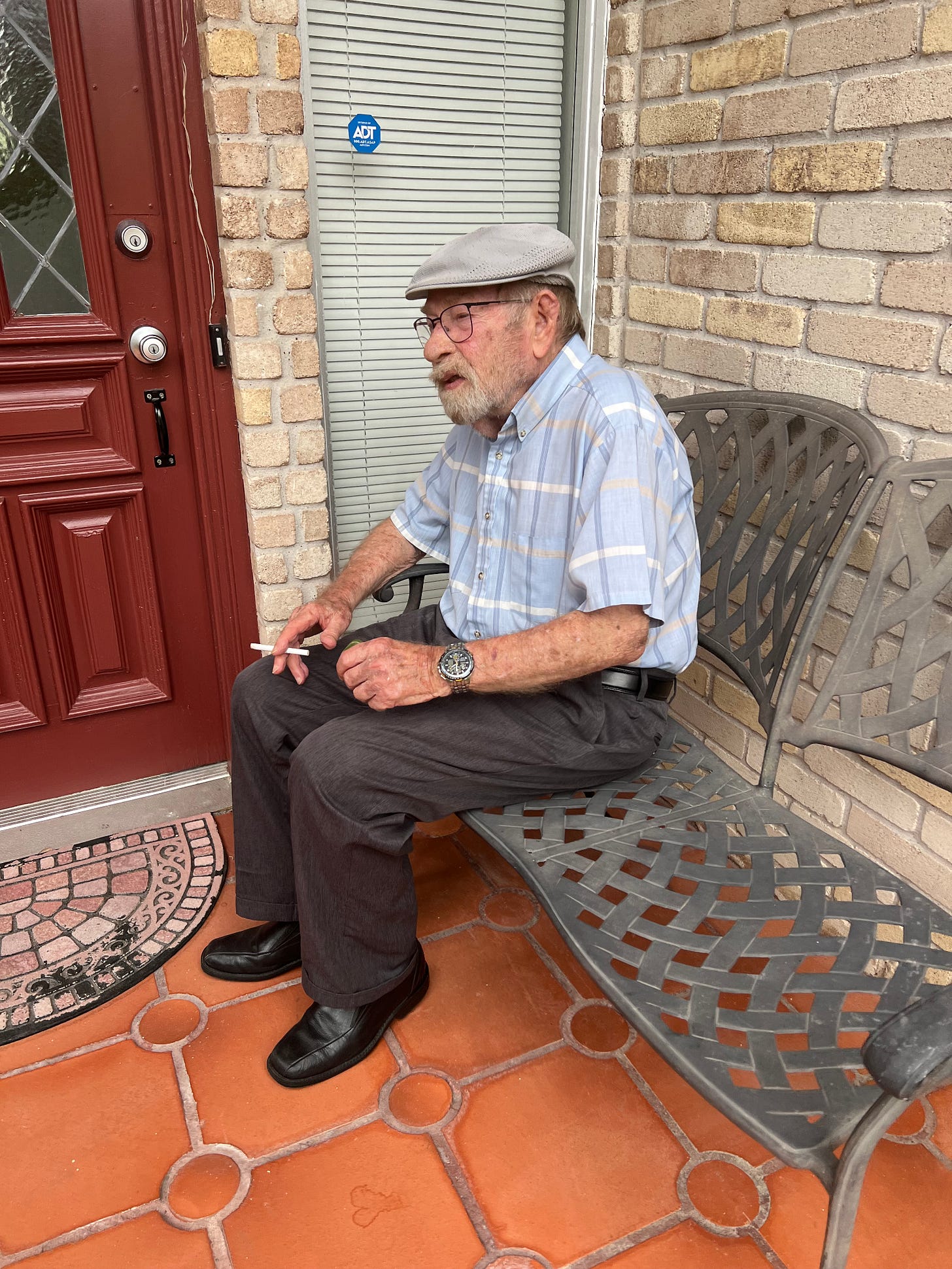Let’s continue where we left off yesterday, with Ivan navigating us through what felt like the middle of nowhere Texas. It was a two-hour drive from the airport to the wedding, and about halfway there, the skies opened up and it started bucketing rain in a way that transformed the blue skies. We passed cows and fields, and Ivan kept asking me in his mix of Spanish and broken English, "Are you sure it’s supposed to be here?" Fair question, honestly.
When we finally arrived at the venue, I was still wearing my casual clothes and my backwards Chabad.org cap. I arrived at the perfect time. They were in the middle of the chuppah. Every single person was dressed in their wedding finest, and here I was looking like I’d just rolled off a very long series of international flights (which, to be fair, I had). Eyes were definitely on me, people wondering who the heck this schmuck was who’d arrived out of nowhere, clearly not dressed for the occasion.
But I’ve always taken after my father in one regard: when we walk into a synagogue, we don’t lurk in the back—we walk straight to the middle or front. So I did exactly that, strolling right up to the front, and when the chuppah ended, I found the groom and gave him a big hug. He was genuinely happy to see me, and that surprise unveiling was perfect.
Thank G-d the hospitality suite had a shower, because after 50 hours of travel, I desperately needed to feel human again before attending a wedding. I got cleaned up, put on my wrinkled shirt and smashed-up black hat, and at least looked somewhat less like I’d been living in airports.
The wedding itself was lovely, and it was great catching up with everyone. But honestly, for the first time since this whole journey began, it actually sunk in that I’d made it. I’d “escaped” the war zone, navigated the chaos, and somehow ended up at the wedding I had given up any hope of attending. The groom was thrilled to see me—though to be honest, who knows if he was genuinely surprised or just playing the part perfectly.
At one point during the wedding reception, I stepped outside for air and locked eyes with this older gentleman. We started talking, and it turned out his name was Pinchas Aloof. When I told him I write stories, he said, “Well, you’re probably going to want to hear this: I sat at the Friediker Rebbe’s table when I was a kid, and I grew up in 770 in the 1940s.”
I was immediately hooked. “Has anybody ever told your story?” I asked. We arranged to meet the next day.
One small disappointment from the wedding: I didn’t get a bentcher. The bride, who’s a very talented artist, had painted a beautiful cover, and the groom had written a lovely approbation inside. It was gorgeous, but somehow I didn’t manage to snag one.
The rest of the wedding was pleasant, but I’d be lying if I said I wasn’t exhausted. In classic potential-Where’s-Waylen-disaster fashion, I was expecting to take the coach bus back with the party group, arrive at the hotel, and be told all the rooms were booked. But the opposite happened: a friend’s brother had a spare bed in his room and let me crash there, free of charge. Very un-Where’s-Waylen-like, and I didn’t have to worry about accommodation at all.
Wednesday morning, we had a lovely brunch that the wedding party had planned. I had a great discussion with my friend and his wife about dating, nonnegotiables, and how much you should stick to your ideals versus being flexible. They disagreed with each other on pretty much everything, which I found cute. I tend to be somewhere in the middle.
After brunch, I went to visit the Aloofs and sat with Pinchas and his wife Yocheved for probably four or five hours. His life story was absolutely incredible—this man has literally been present at every major 20th century event you can imagine.
He was born in Jerusalem under the British Mandate, then moved to Brooklyn as a child, where he merited to have many memories with the Friediker Rebbe. He was present in 1948 in Haifa to watch the British flags get lowered and the British ships leave the bay as Israel declared independence. Then he joined the U.S. Marine Corps, serving in the Korean War. He also served as a rabbi in rural communities in Colombia and Venezuela, served in the Israeli army during the Six-Day War, and was a rabbi in East Berlin where he was present for the fall of the Berlin Wall. He actually welcomed many of the East Germans who crossed over to West Berlin after the wall fell.
This man has also served as a rabbi in Sweden, Mexico, and various other countries. He’s a mohel and shochet and has basically lived through every significant moment of the past 80 years. His wife is equally impressive—she has a PhD in English Literature and is the daughter of a famous Israeli poet. We had a lovely afternoon together.
After saying goodbye, I got an Uber back to Houston Airport with a driver who asked me to call her “C” From the second I got in the car until she dropped me off at departures, she did not stop talking for even a moment—and honestly, I didn’t want her to.
C had been living nomadically since 2016, moving from Houston to Florida to Indiana, and as she put it, had been living in New Jersey for literally “59 minutes” before coming back to Texas. She loved New York and Brooklyn especially: “On one block, you got everyone,” she said, describing how she used to drive a woman from Jersey City every Sunday who paid her $60 just because she felt comfortable with a female driver.
Then she told me about her friend Jeffrey Carter—”Principal Jeffrey Carter,” as she always called him, using his full name in that distinctly Southern way. Jeffrey had been the valedictorian of their graduating class in Jackson, Mississippi, and became a charter school principal in Indianapolis. He achieved everything he wanted to do in life, but tragically died of COVID in 2021 at just 38 years old.
“When he passed, there were like 20 or 30 of us at the funeral,” C told me. “We didn’t know what to do, but thank G-d it was a beautiful service.”
Then she said that before he passed, Jeffrey had just received his master’s degree, and his final assignment was to write his own obituary. At the funeral, his mother got up and said, “I have to let y’all know something—a lot of people don’t know, but you’re reading his obituary that he wrote. It was actually his last assignment, the final thing he did.”
“Nobody could even talk,” C said. “He wrote it so immaculate [sic]. We were like, ’What else can we say?’ He said it all. He literally said it all.”

But the story doesn’t end there. Jeffrey had always encouraged his best friend Demarcus, telling him, “Demarcus, do something with yourself.” After Jeffrey’s death, Demarcus decided to finally become a doctor. “He just became a doctor,” C told me with pride. “And he’s from Mount Bayou, Mississippi. When he crossed that stage, we knew he was thinking of Jeffrey Carter. The whole back row was crying.”
C also shared how they had to clean out Jeffrey’s house after he died—just her, Demarcus, one other friend, and Jeffrey’s mother. She ended up with one of Jeffrey’s blue cast iron pots, which she still cooks with faithfully. “Every time I use that pot, I think of Jeffrey Carter,” she said.
She talked about growing up in Jackson, Mississippi, where “you could have all cultures sitting in a Baptist church” and how different that was from Texas, where neighborhoods are still divided by race. “When I arrived in Texas, it’s still divided. When you’re driving through the neighborhoods, it’s either white, black, Asian, Indian.”
“You know what’s so hard now,” she said, “because we grew up reading the newspaper. I literally dropped someone off the other day and they had a newspaper at the end of their driveway. And I was like, ‘We still got papers?’ I was the kid that on Sundays would cut out the coupons.”
When I mentioned that I freelance as a journalist she lit up: “That is a blessing to hear. That is so inspirational, just to know that people’s hearts are still in it. Because the media has truly changed.”
By the end of our ride, C had painted a complete picture of someone who refuses to let the world’s negativity dim her light.
“I just want to wake up, pray, meditate, have a beautiful day and not stress about stress [sic],” she said. “Not be angry and not look around yourself and just see the bad, because that’s what they’re feeding us.”
[Honestly, C was exactly the kind of human being you hope to never encounter when you’re exhausted from 50+ hours of travel]
I arrived at the airport for my 6:55 PM flight to New York. As of writing this, it’s now 6:57 PM, and we haven’t boarded yet. There have been significant delays, because apparently it wouldn’t be a proper Where’s Waylen adventure without some sort of travel problem. The current estimate has us taking off around 8 PM.
So for now, I leave you at Gate 23 of Houston Hobby Airport, waiting for a flight that may or may not actually take off, because apparently I have one final transportation hiccup.
I plan to finish this saga when I actually arrive in New York—not just when I think I’m going to arrive in New York. So you thought you could escape another day of this blog? Think again! There’s one more edition coming because this journey only ends when I’m actually back in Crown Heights. Until next time (from yet another airport delay)!






